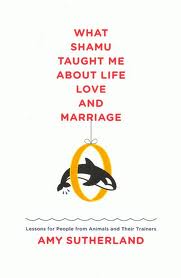Marriage researcher John M. Gottman claims that he can predict with 94% accuracy which couples will last happily and which, sadly, will not. Studies seem to prove him right. What’s the magic variable, the crucial key? It’s not height or weight. Neither education nor wealth. Not even shared interests, well-synched sex drives, or similar diets (“Keep the vegans away from the beefeaters!” you can almost hear the researchers cry out.) The single most important factor for predicting healthy relationship longevity: the ratio of praise to criticism.
Apparently, those couples that give each other real, honest praise at least five times as often as they dole out critique stick together like sushi rice in a seaweed roll (without the raw fish, my vegan friends). Those that drop below that number predictably start to fall apart.
This, of course, is the insight that initially piqued my interest in positive reinforcement training. A friend forwarded Amy Sutherland’s piece in the New York Times “What Shamu Taught Me About a Happy Marriage” and soon thereafter, I devoured her similarly titled book. She had gone to the famous Moorpark College in San Diego to study exotic animal training and found herself tickled and intrigued to learn that the same techniques that could teach a killer whale to jump through a hoop could painlessly work to teach her husband to toss his dirty laundry into the hamper rather than onto the floor. Even after he caught on to the game, she found, the pattern still held. And he could do the same with and for her.
The implications of all this echo into all corners of human living, especially if we widen our scope of what we consider “relationship.” I’d like that kind of healthy, long-lasting, eager-to-learn-and-serve vitality with my students and colleagues at work. I’d like that link with family members and fellow improvisors. Heck, I’d like a positive connection with anybody I meet!
It’s this dynamic too, I’m convinced, that makes us want to play with improvisors who, rather than going for the cheap laugh, concentrate on making those they’re on stage with look good. It’s why status-raising warms a friend’s heart more than sarcasm or belittling–even when they’re both in jest. One of my college roommates, Eric Jorgensen, and I came to find ourselves a bit prickly at the end of the day even though we knew that we liked each other just fine. We eventually traced the tension back to our near-constant needling so we decided to experiment. Rather than choosing negative sarcasm, we’d go with warm welcome instead. “Nice shirt, loser!” became “Ted, I missed you so much!” or “Eric, where have you been, my love?” It didn’t matter that we knew it was a construct–the positivity still worked its magic. Within short order, we actually did look forward to seeing each other at the end of the day. And the rest of the year was a blast.
I’m always thankful for the reminder to check my ratios. In the classroom, on the ballfield, at home with Melissa. If I’ve showered my partners with honest praise, I’m confident they’ll want to return. And, ironically, when I do need to or even want to offer corrective feedback, they’re much more likely to hear it without recoil or defensiveness.
Good stuff, Shamu. Good stuff.
Where do you think your praise-to-criticism ratio would fall in the relationships you most care about? How might you find ways to lift it higher? Or, if you’re resistant to the idea at all, what do you think makes you so?



Ted, I think the positive reinforcement people have something going for them for sure. The brain has two parts tot the amygdala – and it has a joy side and a misery/fear side. If you are in the joy side, you actually cannot experience misery. If you are in the misery side, there are joy receptors so you can have teasers. But stay in the joy side, and life changes in a big way. The best trainers forgo *corrective* feedback because it is about correcting what is *wrong* (a negative)…they use reinforcement of what is positive. I want my ratio to be 0 negative, 100 positive. Learning how to do that is hard…….LOL.
BTW, I LOVE those *reads* boxes down below.